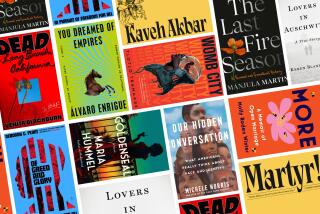Marriage Links the Emotional Struggles of ‘Interpreter’s’ Troubled Souls
Two collections of short stories, very different but equally entertaining, have recently been released on audio.
Highly anticipated was “Interpreter of Maladies,” by Jhumpa Lahiri. The winner of many literary prizes, including the Pulitzer Prize and the O. Henry Award, this is a rare treat, as the stories are as delightful as the presentation. (Soundelux Audio Publishing; unabridged; four cassettes; six hours; $24.95; read by Matilda Novak.)
Lahiri, who is of Indian descent, was born in London and raised in Rhode Island but visited India often as a child. The characters in her stories are Indian and Pakistani, but their ethnicity simply provides flavor for themes that are universal. She melds cultures and problems as characters struggle to connect within a marriage or deal with the boredom and loneliness of a life far removed from their families.
A continuing theme is matrimony. Couples allow marriages to die, abuse them, try to heal them or simply long for them. Each of these stories is richly told, as the characters bring their psychological tics to brief encounters and long-standing relationships.
In the opening tale, “A Temporary Matter,” a married couple are trying to cope with the harsh loss of a stillborn child. During a blackout, Shoba and Shukumar tell their secrets, and the listener believes they are growing closer and healing the rift in their marriage. Lahiri changes our interpretation of the situation by subtly shifting the focus so that by the end of the tale we see the actual path being taken by this young academic couple.
Each story is told with a fresh approach and vivid language. Narrator Matilda Novak picks up on these changes and alters her delivery for each tale. She does this with a delicate touch. For instance, when we meet Twinkle, an energetic and Americanized young bride, we clearly hear the lack of guile in her voice. She sounds open and alive, but Novak does not allow Twinkle’s brio to overpower the story.
The narrator has crisp diction and a pleasing, feminine voice. She does not use accents but changes the pace and tone of her voice for male and female characters. Her pronunciation of foreign words is flawless. The only problem with this collection is that the titles of the individual stories are not listed anywhere on the cassettes or the box; that’s annoying.
*
If you prefer more fright in your fiction, listen to Peter Straub’s latest collection of short stories, “Magic Terror.” (Random House Audiobooks; unabridged; eight cassettes; 14 hours and 30 minutes; $39.95; read by Ron McLarty and Beth McDonald.)
The subject matter of these seven stories ranges from the horror of child abuse to the supernatural terror of hungry ghosts. Black humor, crime and redemption are the subject of “Mr. Clubb and Mr. Cuff,” a riff on Herman Melville’s short story, “Bartleby the Scrivener.” In his opening piece, “Ashputtle,” Straub recalls another work of classical fiction, “The Yellow Wallpaper” by Charlotte Perkins Gilman. But in this twisted tale, a “princess” seeks an ugly revenge for a traumatic event committed against her years earlier.
The narrators deftly deliver the different tone of each story. MacDonald, who reads only the first story, “Ashputtle,” is gloriously terrifying. Sarcasm and angry arrogance drip from the venomous voice of one very angry female. The character’s anger never abates, but MacDonald’s is not a one-note performance, as deep-rooted pain is also clearly heard in the narration.
Ron McLarty sounds weary and rather gruff while narrating “Ghost Village,” a creepy and unforgettable tale set in the Vietnam War that deals with child abuse. He adopts a stiff arrogance and a slight dramatic flair for “Hunger, an Introduction,” a droll and offbeat yarn of an angry ghost. McLarty’s strokes are a bit broad in this tale, though not so much as to squelch the humor in his character’s barely contained fury and haughty demeanor. Later, in the same story, he delivers that specter’s longing for life with a touching poignancy.
Though the pauses in the stories are sometimes not quite long enough, the only real complaint is that like “Interpreter of Maladies,” the story’s titles are not listed anywhere.
*
Rochelle O’Gorman reviews audio books every other week. Next week: Dick Lochte on mystery books.
More to Read
Sign up for our Book Club newsletter
Get the latest news, events and more from the Los Angeles Times Book Club, and help us get L.A. reading and talking.
You may occasionally receive promotional content from the Los Angeles Times.









